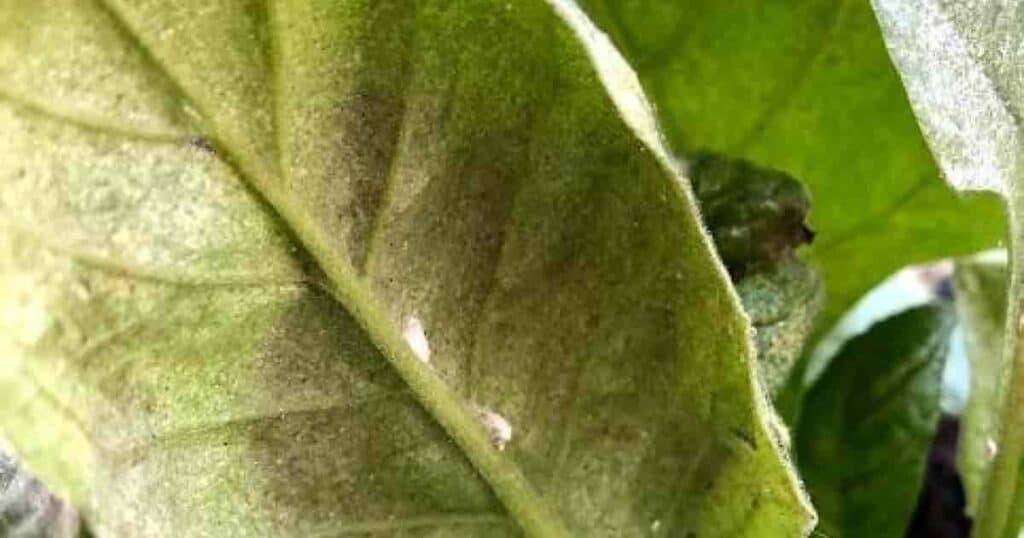Imagine coming home one day to find messy cobwebs all over your houseplants or maybe even on plants in the garden or flower beds.
How did these webs get there, and should you be worried? Unfortunately, the answer is yes. You should be worried because these webs are telltale signs of a spider mite infestation.

Spider mites are a common sap-sucking pest that can do serious damage to your plants if the population gets out of control.
One of the most frequently recommended “organic” pest remedies is insecticidal soap. Perhaps you’ve heard of it, but this treatment remains shrouded in mystery.
Today, we’ll take a look at just what insecticidal soap is, what it does, and whether or not it really is a good option when dealing with a spider mite infestation.
Is Insecticidal Soap Good for Getting Rid of Spider Mites?
Technically, yes, insecticidal soap is good for fighting a spider mite population.
However, its effectiveness can be a little spotty, and the results may be slower than desired, leaving many to conclude it isn’t working when it actually is.
What Is Insecticidal Soap?
Back in the day, it was common to treat plants with Fels-Naptha soap diluted in water.
For those unfamiliar with this liquid soap, it’s still available to this day and is a popular ingredient in homemade laundry detergent and as a household cleaning supply.
Unfortunately, when chemical pesticides became popular after WWII, treating your plants with soap lost its popularity – until we discovered pesticides were resting superbugs.
Today, due to a combination of concern over pest resistance and potential environmental damage, natural remedies such as insecticidal soap are again becoming popular.
Oddly enough, any liquid dish soap like Dawn that contains fatty acids can be considered an insecticidal soap.
In fact, if you make your own soap at home, you already have a great insecticidal soap on-hand.
How Does Insecticidal Soap Work?
Insecticidal Soaps are made from potassium salts of fatty acids in commercial markets. This type of soap spray kills the insects by disrupting the insect cell membranes and structure.
Using a spray made with insecticidal soap works in two different ways.
The sprays can clog an insect’s airways, causing them to suffocate.
This can take anywhere from a few hours to a couple of days, so don’t expect the affected common pest to just fall over dead immediately.
The other way insecticidal soaps attack soft-bodied insects is more interesting.
The fatty acids within the soap can get past the insect’s protective waxy coating. Once absorbed, it dries the insect out, killing it.
Again, the effects take some time, and it doesn’t work very well on hard-bodied insects.
But Spider Mites Aren’t Insects, Right?
Spider mites aren’t insects but rather a type of arachnid that’s able to produce silk, much like a spider.
They don’t use this webbing to catch prey but instead create protective canopies and bridges between leaves and outdoor plants they can travel on.
The most famous species is the two-spotted spider mite (Tetranychus urticae), but there are actually around 1,200 species of spider mite within the Tetranychidae family.
These predatory mites are known to thrive in warm, dry conditions. You may notice some telltale signs of spider mite damage when you see leaves curling or falling off. Tiny white or yellow spots on the foliage are also an indication.
Yet, despite the fact that they aren’t insects, they can be treated with a number of remedies that are commonly reserved for insects.
This includes insecticidal soap.
So Just How Effective is Insecticidal Soap Against Spider Mites?
Unless you’re looking for a miracle cure, insecticidal soap can be considered fairly effective against spider mites.
This soap solution also works effectively for indoor plants, especially when the climate is controlled.
The trick is actually hitting them with it.
For the treatment to work, you must soak the infected
If you wish to establish predators in a heavily infested orchard or garden that has few predators, use a soap spray or selective miticide to bring pest mites to a lower level and then release predatory mites.
Spider mites prefer to hide on the undersides of leaves, so just spraying the tops won’t help.
The soap must make direct contact to take effect, and simply hitting the leaf beside a spider mite won’t have any effect.
With a true aim and a little patience, the results will be slow but definite.
Other Concerns
One very important consideration is the types of plants you’re trying to treat, as there are many soap-sensitive plants out there.
Beans and peas, cucumbers, ferns, and gardenias are just some plants that don’t like soap.
Therefore, you should test a tiny area of the plant 24 hours before attempting to treat the entire plant.
If you spot leaf damage in the test area, you will know the plant is sensitive to soap.
Another problem will affect garden plants but not indoor plants.
Insecticidal soap, just like other organic pesticides, doesn’t discriminate and can also harm or even kill beneficial insects such as ladybugs, predatory mites, or bees if it makes direct contact.
Since you will be coating the entire plant surface, it’s best to use this treatment around dawn or dusk when the beneficial predatory insects are least likely to be around, and you will hit the plant pests almost exclusively.
Finally, you have to be careful if you are buying insecticidal soap, as it often contains additional active ingredients such as essential oils or horticultural oil products that can do damage on their own.
Be sure to check the ingredients and follow any label directions carefully.
If you’re making insecticidal soap from scratch at home, avoid any additional ingredients, such as scents, to ensure it’s as safe for your plants as possible.